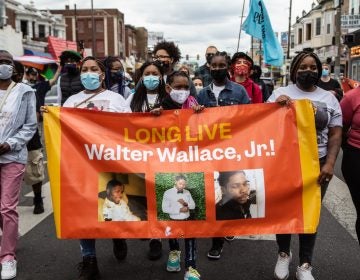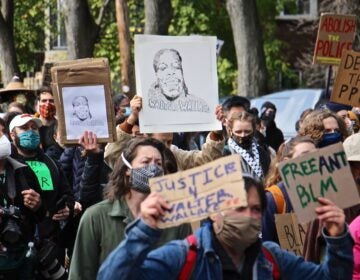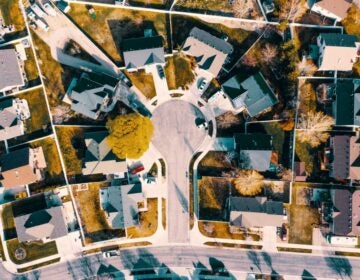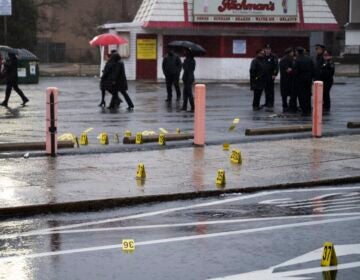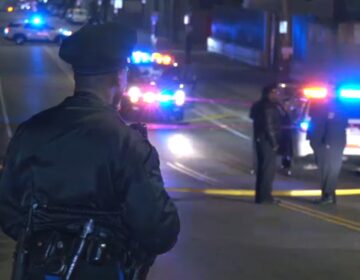‘We want a new vision’: A year after police killed Walter Wallace Jr., Philadelphians call for change
About 100 people gathered in Germantown to honor Walter Wallace Jr., and call for Philadelphia to invest in alternatives to traditional policing.

People gathered for a vigil for Walter Wallace Jr. at the Germantown Unitarian Society in Philadelphia on Oct. 27, 2021. (Photo courtesy of Chris Rabb)
It has been one year since two police officers shot and killed Walter Wallace Jr. in front of his West Philadelphia home.
The Power Live Free Campaign organized a vigil on Wednesday evening outside the Unitarian Society of Germantown to honor Wallace’s life and to call for a reimagining of public safety in Philadelphia.
About 100 people gathered for the event, holding Black Lives Matter signs and signs with Wallace’s image. Cars driving along the busy Lincoln drive were constantly honking in support.
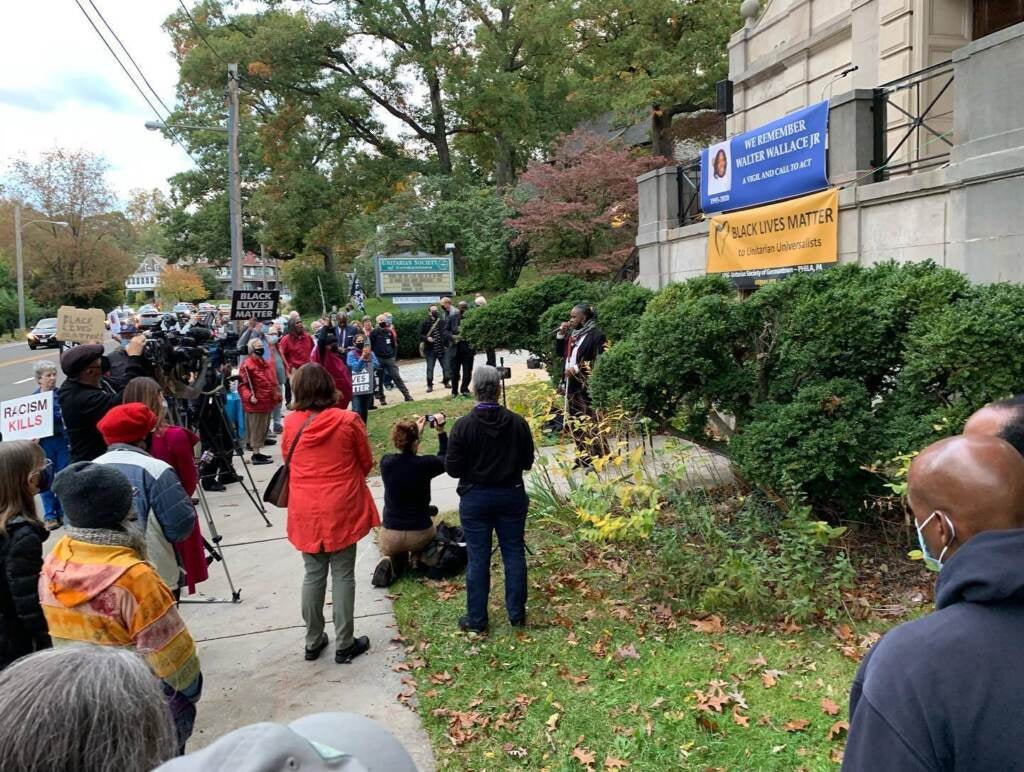
Reverend Mark Tyler, co-chair of Power Live Free and pastor at Mother Bethel African Methodist Episcopal Church, said Philadelphia needs an alternative emergency phone number. Police officers Thomas Munz and Sean Matarazzo came to Wallace’s house in response to a 911 call made by his sister asking for help to deal with her brother’s erratic behavior. She asked for medics and said he didn’t have weapons, according to audio recordings of the 911 call.
“Unfortunately in our city when a person is facing a mental health crisis the family doesn’t have a choice except to call 911, for the most part,” Rev. Tyler said. “I would imagine that the vast majority of stories like Walter Wallace would end differently if we called somebody different in the first place.”
Philadelphia said on Tuesday that they will equip all patrol officers with Tasers. That effort will cost $14 million, part of the already approved city budget.
But organizers of the vigil said Tasers are the bare minimum, and they want the city to divest money from the police budget and into alternate programs.
“Police officers ought to have non-lethal and less lethal weapons, but that will not give us the public safety that we want,” said Rev. Tyler. “We want something more than Tasers, we want a radical new vision and reallocation of dollars. Call it defund, call it whatever you want, but we want a new vision.”
Rev. Tyler said especially in moments of a mental health crisis, “an armed response should not be the first response,” and instead, people who are equipped in handling mental health issues should be on call.
“They will recognize, in that moment,” said Rev. Tyler, “the right questions to ask, what family members to engage, and how to begin to bring the situation down.”
Steve Strahs, on the public safety team for the LIVE free campaign of power, read the group’s five demands for the city:
1) A state of the art 911 system that provides adequate, trained, and fairly treated staff equipped with the best triage procedures for decision making.
2) Link 911 with civilian care providers 24/7 who have instant access to call files, “as it aligns with the new federally mandated 988 mental health line.”
3) Philadelphia must deploy civilian first response models, instead of their current co-responder program involving an officer and clinician.
4) Philadelphia must rapidly develop a pilot program of civilian care responders that can be dispatched in response to a range of typical 911 calls for health, wellbeing, and general support.
5) A full analysis of Philadelphia 911 calls for an assessment on how to maximize successful outcomes through a redeployment of police and other resources.
“Philadelphia police officers are institutionally ill-equipped to protect and care for our most vulnerable residents,” said Strahs as he read the demands.
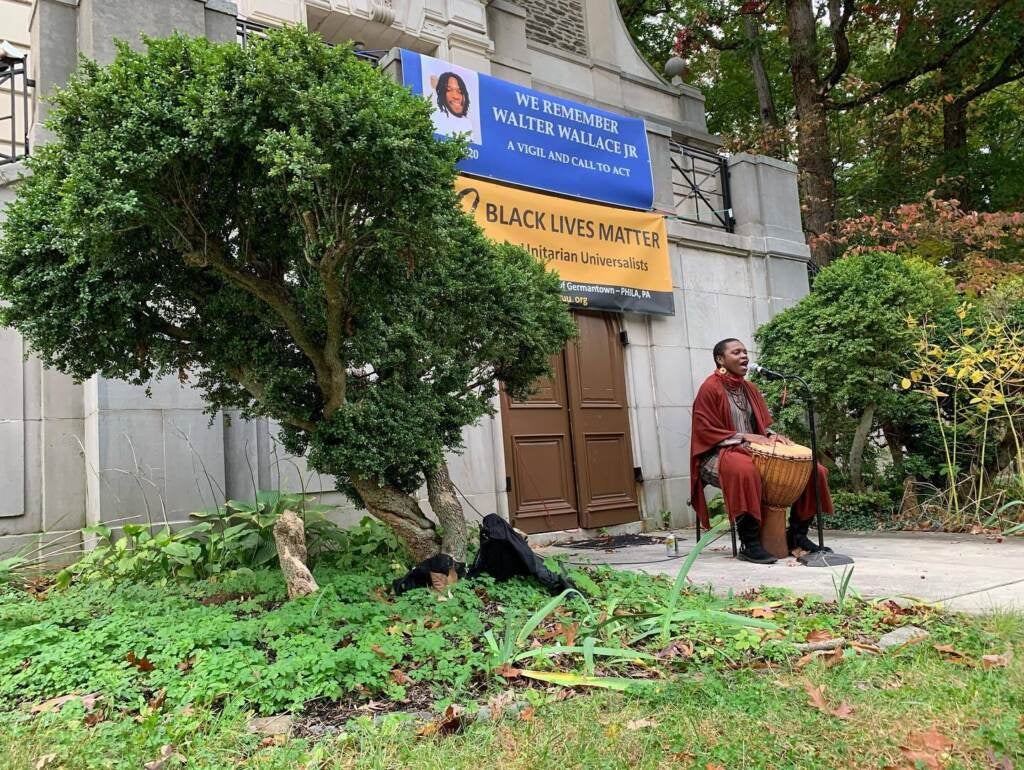
Strahs noted that often people in crisis being transported for treatment by police “must be cuffed behind their back and wear ankle shackles.” He said this “simply disqualifies them from this sensitive work.”
In the wake of Wallace’s Jr.’s killing, the police department began using a new script for 911 calls, asking callers if the emergency involves a mental health crisis, and started testing a new behavioral health training for officers. Critics have said that progress has been too slow and too incremental.
WHYY is your source for fact-based, in-depth journalism and information. As a nonprofit organization, we rely on financial support from readers like you. Please give today.


